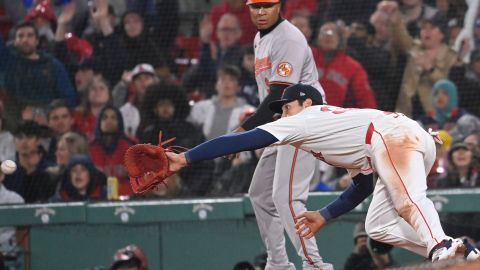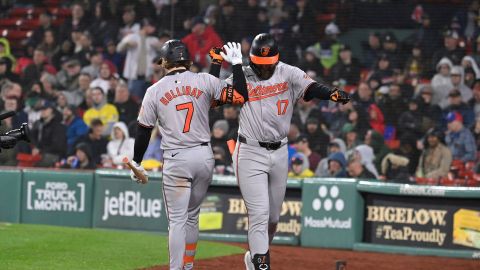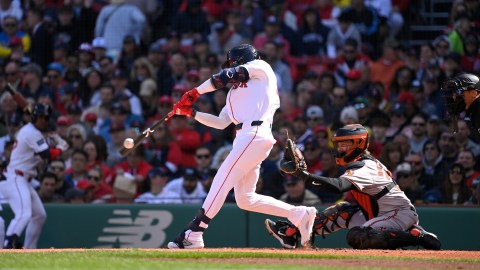The Red Sox and Orioles haven't met since the first weekend of July.
Believe it or not, a lot has changed since then.
The Sox took two of three in a series at Fenway Park and left the Fourth of July weekend only a game and a half out of first place. The two clubs meet starting Tuesday night in Baltimore with the Sox now seven games behind the Yankees and Rays in the AL East.
The Orioles are a bit of a different team as well since that series in early July. They've since hired Buck Showalter to manager their club, a move that has paid dividends up until this point.
Since Showalter took the reigns on Aug. 3 and has led the Orioles to a 16-10 record. In fact, the O's reeled off eight wins in the first nine games with Showalter at the helm.
The fact remains though that the Orioles are in last place in the AL East and certainly aren't going anywhere anytime soon. And while they've had some disappointments including underachieving from players like pitchers Brian Matusz and Kevin Millwood and catching prospect Matt Wieters, there is still some help on the horizon.
Stacey Long of CamdenChat.com answered some questions for NESN.com about the state of the Orioles.
NESN.com: The Orioles are 16-10 since Showalter took over, including an 8-1 start. What kind of changes, both in style of play and attitude, has he instilled to turn things around?
Stacey Long: Saying that the Orioles have "turned things around" under Showalter is a bit premature. Certainly, his arrival has facilitated some improvement; the players have acknowledged that the stability eases their minds. They no longer have to wonder who will be their manager tomorrow, and they don’t have to hear the constant rumblings of another managerial change. Additionally, it has been posited that Showalter’s no-nonsense attitude and reputation for holding players accountable has given the team renewed focus, although there is no way to quantify that.
Showalter certainly has shown more fire than the other two managers for the 2010 Orioles, and perhaps some of that has translated to his team. He doesn’t hesitate to defend his players when he feels they’ve been wronged (he’s already been ejected once), and he seems to be constantly engaged with the players in the dugout, always watching the game from the rail, always discussing something with someone. Has this translated to more wins? Who knows.
Mostly likely there has been some small amount of team improvement based on Showalter’s presence, but the overall improved record probably has more to do with other factors. The Orioles had the good fortune of running into the Angels and White Sox as they were struggling, for one. Additionally, the pre-Showalter Orioles had a winning percentage of .305. The Orioles aren’t a good team, but they are not a .305 team. They had been performing below talent level, especially the pitching. It had to rebound eventually. Showalter’s arrival in Baltimore was really the perfect storm to get the team playing to an improved record.
NESN: In his first full season, Matt Wieters has regressed after a decent rookie campaign. Expectations for the young catcher are sky high. Is that a possible reason for his struggles this season, or is it something else?
SL: Expectations for Wieters have been very high since he was drafted, but the hype has died down and he has been able to function with no more attention than the other young Orioles. It’s been disappointing that he hasn’t come around with the bat the way everyone expected, but he has had a lot of work to do as a catcher, and that has come first. He’s learning to effectively play the most difficult position on the field, and he’s gotten quite good at it. He has thrown out 29 percent of would-be base stealers, which is second among full-time catchers in the American League to only Joe Mauer, and he leads the AL in total zone fielding runs above average. He has improved at blocking the plate this year and has allowed only one passed ball all season.
In addition to his defense, there is the fact that the 2010 Orioles have had 77 games started by a pitcher in his first or second year in the majors, none of whom is older than 25. Coming into the season, veterans Jeremy Guthrie and Kevin Millwood had a combined total of 465 major league games started in their careers; the others who have started (Chris Tillman, David Hernandez, Jake Arrieta, Brad Bergesen, and Brian Matusz) had a combined total of 58. So not only has Wieters been focusing on improving himself, he’s been guiding a group of youngsters as well.
Yes, his seeming regression with the bat is troubling, but when you put it into perspective with all of the responsibilities that have been heaped onto this young man, it’s easier to swallow. If he cannot get the bat going in 2011, that will be the time for real concern.
NESN: Brian Matusz has lost twice as many games as he's won, but his ERA and strikeout numbers aren't horrible. Has he been better than his numbers, especially his win-loss record, indicate?
SL: Depending upon what numbers you’re looking at, yes, Matusz has been better than you might think. A pitcher’s win-loss record is probably the least effective way to gauge his performance. Matusz has 12 losses this season, and in nine of those the Orioles have scored two or less runs. That’s not to say Matusz pitched fantastically in all nine of those losses, but it doesn’t matter much what a pitcher does on the mound when he’s getting that kind of run support.
Matusz is a young, talented pitcher who is taking his lumps by growing up in the A.L. East. He’s already faced the Yankees, Rays, and Red Sox three times each this year, and the Blue Jays once. That’s a tall order for a 23-year-old rookie and while he’s certainly had his troubles, he has still pitched at least six innings while allowing three or less earned runs (the arbitrarily designated "quality start") in 16 of his 26 starts.
NESN: Kevin Millwood and his 2-14 record and 5.63 ERA have obviously been a huge disappointment especially following his bounceback season in Texas last year. What do you think has been the cause for such a dramatic drop-off?
SL: Millwood’s 2009 season was an outlier; 34-year-old pitchers who have spent the previous three seasons pitching as Millwood did from 2006-2008 don’t just get better and stay that way. If the Orioles expected Millwood, now 35, to make the move from the A.L. West to the A.L. East and pitch like his 2009 numbers as opposed to those from the previous years, they were the only ones.
Millwood wasn’t as good as it appeared in 2009, but he isn’t as bad as the numbers indicate this season. Of the three advanced statistics that are used to determine a pitcher’s luck, batting average on balls in play (BABIP), LOB percentage, and home runs per fly ball (HR/FB), Millwood scored on the lucky side of HR/FB and LOB percent in 2009 and has been extremely unlucky with BABIP in 2010. His true talent level is probably somewhere in between, although maybe I’m simply feeling charitable towards him given his outstanding performance against the Angels this past weekend.
NESN: Despite the struggles, the Orioles do have some good young prospects. Chris Tillman is likely going to be called up, and Zach Britton is close. How much optimism is there for the future with young prospects like those two along with players like Guthrie, Matusz and Wieters?
SL: While logically it is easy to look at the young talent on the Orioles and in the minors and predict that better days are ahead, the sad truth is that this season has taken a lot out of the fan base. No one expected the Orioles to contend in 2010, but they had been acknowledged by a number of baseball analysts as up-and-coming. One look at the roster made O’s fans giddy at the potential: the most promising group of young pitchers the team has seen in years, a potential superstar behind the plate, and an enviable logjam of talent in the outfield. It made a lot of O’s fans optimistic for the first time this decade.
And what did the Orioles do with that optimism? They stomped on it. Then they kicked it in the ribs and spit in its face.They started the season 2-16, the hitters couldn’t hit, the pitchers couldn’t pitch. The young players were regressing, the free agents were stinking up the ballpark, and the fans couldn’t believe how badly they’d been duped.
The Orioles have a lot of young talent, and in the last few weeks they’ve actually been playing like a real team. But the fans aren’t going to be fooled again. It will take an actual winning team on the field before we’re convinced. It is kind of sad, but the Orioles only have themselves to blame.
Thanks again to Stacey Long of CamdenChat.com for contributing to this article.




